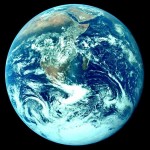Earth Day was created by Sen. Gaylord Nelson to bring awareness to environmental issues which were not being addressed in the political arena. In the spring of 1970, Nelson organized a nationwide grassroots demonstration to further promote conservation involvement and awareness; the first official Earth Day was born. These efforts led to the creation of the United States Environmental Protection Agency and the passage of the Clean Air, Clean Water, and Endangered Species Acts.
Here is some current “green” information:
- The garbage in a landfill stays for approximately 30 years.
- Each person throws away approximately 4.6 pounds of garbage every day.
- 84% of all household waste can be recycled.
- 14 billion pounds of trash is dumped into the ocean every year.
- Most families throw away about 88 pounds of plastic every year.
- One bus carries as many people as 40 cars!
- Every ton of paper that is recycled saves 17 trees.
- Recycled paper requires 64% less energy than making paper from virgin wood pulp.
- The amount of wood and paper we throw away is enough to heat 50 million homes for 20 years.
- It takes 90% less energy to recycle aluminum cans than to make new ones.
- The energy we save when we recycle one glass bottle is enough to light a traditional light bulb for four hours.
- We each use about 12,000 gallons of water every year.

